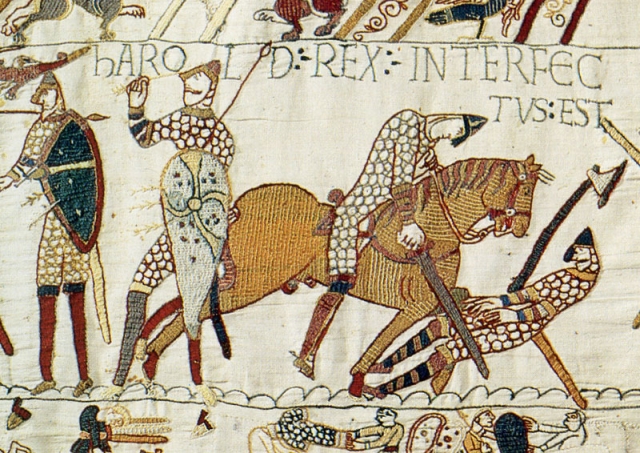War in Medieval Britain (c. 1000–c. 1300)
War and the consequences of war

The Norman Conquest of 1066. No date in English history is more well known; no image more famous than the Bayeux Tapestry. The very weight of the word ‘conquest’ can seem to resound with an inevitable, onward press of violent conquest spreading outwards across the island of Britain through the thirteenth century. These are familiar themes—but should we trust that familiarity?
In this podcast, Dr Winkler and Dr Jones go back to the primary sources, exploring what is surprising about how medieval writing, pictures, and buildings depicted and responded to warfare in medieval Britain. At the heart of their discussion is the point that conquest and warfare looked very different depending on who you were, where you were, and when you wrote. Reactions varied by individual, community, and foreign realm; in Wales, 1093 came to mean more than 1066; and some questioned the morality of William the Conqueror’s invasion even in the late twelfth century.
History might be used for biased, political ends, but this was by no means the only operative force behind recording war. Reporting showed a great sensitivity to the human consequences of warfare, and challenged the inevitability of conflict. The urge to commemorate and to share sorrow, even generations after a battle, remained a potent chord in medieval historical thinking.
1. If writers in medieval Britain wrote a lot about war does that mean it was happening a lot?
2. Why are relations between the realms framed in terms of conquest?
3. What were perceptions of the Norman Conquest in England/Wales and the continent?
4. How do opinions change of the Norman Conquest over time?
5. What different forms of media were used to relate the Norman Conquest – what was the chronicler’s agenda?
6. Commemorating the fallen through architecture.
7. What kind of information to historians want to recover from the conflict? How do they use stories to do this?
8. Linking the history of Wales to classical Troy and Rome through literature.
9. How important was the idea of justice to the chroniclers?
10. Do views and opinions of the conquest change?
11. An introduction to some of the key chroniclers.
12. What did they see as the causes of conflict in the 12th and 13th centuries?
13. Do the chroniclers see this as a particularly violent era?
14. What were the causes of warfare? How important was national identity?
15. Chroniclers' concerns for the victims of conflict.
In order to access the full content of the podcasts please Login or Join the HA.

